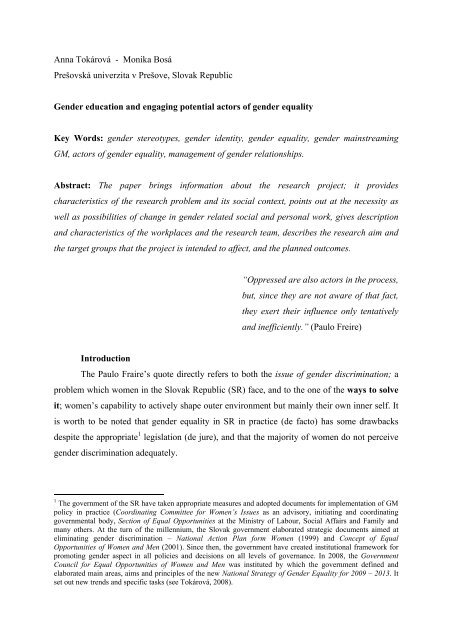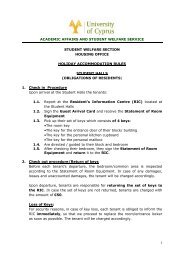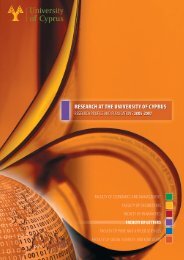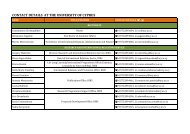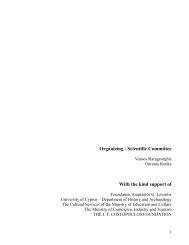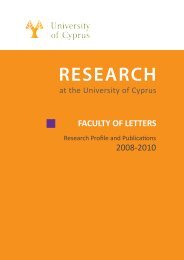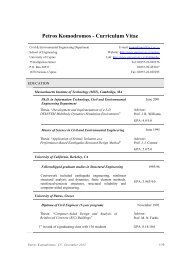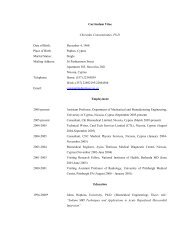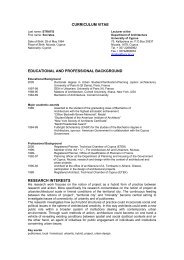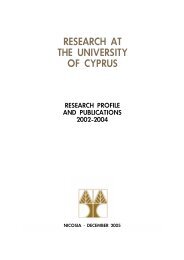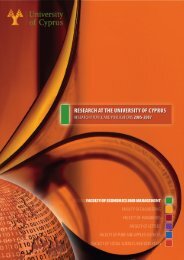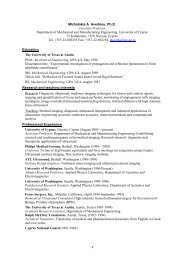Anna Tokárová - Monika Bosá Prešovská univerzita v Prešove ...
Anna Tokárová - Monika Bosá Prešovská univerzita v Prešove ...
Anna Tokárová - Monika Bosá Prešovská univerzita v Prešove ...
Create successful ePaper yourself
Turn your PDF publications into a flip-book with our unique Google optimized e-Paper software.
<strong>Anna</strong> <strong>Tokárová</strong> - <strong>Monika</strong> <strong>Bosá</strong><br />
<strong>Prešovská</strong> <strong>univerzita</strong> v <strong>Prešove</strong>, Slovak Republic<br />
Gender education and engaging potential actors of gender equality<br />
Key Words: gender stereotypes, gender identity, gender equality, gender mainstreaming<br />
GM, actors of gender equality, management of gender relationships.<br />
Abstract: The paper brings information about the research project; it provides<br />
characteristics of the research problem and its social context, points out at the necessity as<br />
well as possibilities of change in gender related social and personal work, gives description<br />
and characteristics of the workplaces and the research team, describes the research aim and<br />
the target groups that the project is intended to affect, and the planned outcomes.<br />
Introduction<br />
“Oppressed are also actors in the process,<br />
but, since they are not aware of that fact,<br />
they exert their influence only tentatively<br />
and inefficiently.” (Paulo Freire)<br />
The Paulo Fraire’s quote directly refers to both the issue of gender discrimination; a<br />
problem which women in the Slovak Republic (SR) face, and to the one of the ways to solve<br />
it; women’s capability to actively shape outer environment but mainly their own inner self. It<br />
is worth to be noted that gender equality in SR in practice (de facto) has some drawbacks<br />
despite the appropriate 1 legislation (de jure), and that the majority of women do not perceive<br />
gender discrimination adequately.<br />
1 The government of the SR have taken appropriate measures and adopted documents for implementation of GM<br />
policy in practice (Coordinating Committee for Women’s Issues as an advisory, initiating and coordinating<br />
governmental body, Section of Equal Opportunities at the Ministry of Labour, Social Affairs and Family and<br />
many others. At the turn of the millennium, the Slovak government elaborated strategic documents aimed at<br />
eliminating gender discrimination – National Action Plan form Women (1999) and Concept of Equal<br />
Opportunities of Women and Men (2001). Since then, the government have created institutional framework for<br />
promoting gender aspect in all policies and decisions on all levels of governance. In 2008, the Government<br />
Council for Equal Opportunities of Women and Men was instituted by which the government defined and<br />
elaborated main areas, aims and principles of the new National Strategy of Gender Equality for 2009 – 2013. It<br />
set out new trends and specific tasks (see <strong>Tokárová</strong>, 2008).
1. Research problem and its context – the symbolic aim of the research<br />
Recently, there has been recorded certain stagnation in the development of social<br />
conditions 2 and the quality of life of women in Slovakia. Social conditions for professional<br />
and personal self-realisation and for the development of woman’s gender identity have<br />
become more harsh (although the above statement undeniably holds for men as well). Woman<br />
is more frequently made redundant than man, is underpaid, discriminated in her professional<br />
career, at job interview, and is object of gender related and domestic violence etc. (Bútorová-<br />
Filadelfiová, 2005, Jezná, 2009, Repková, 2007).<br />
One of the causes of the present, rather unfavourable, state, apart from the financial<br />
and economic crisis, is in the existing institutional mechanisms of social, political and<br />
economic life. Organisation of life within the institutions led by men has been governed, for a<br />
long period, at both formal and informal level, by principles which prefer traditional<br />
masculine values and norms: pushfulness and aggressiveness to solidarity, competitiveness to<br />
cooperation, actual performance to performance potential, racionality to emotions and<br />
intuition, work to private and family life, internal organisational interests to exterior interest,<br />
and quantitative success indicators to qualitative ones. Typical for such organisations is a<br />
“glass ceiling”, a barrier hindering women to access senior managerial positions. In their<br />
organisational structures and processes, there are more or less covert, yet lastingly anchored<br />
basic manifestations of gender insensitivity (blindness) and both horizontal and vertical<br />
gender segregation of occupations (Křížková - Pavlica, 2004, Filadelfiová, 2008, Frk, V.,<br />
2003).<br />
“Traditional” models of attitudes and organisational culture result from thousand-year<br />
processes of gender socialisation and education following patriarchal cultural constructs –<br />
gender stereotypes 3 . Obsolete gender stereotypes still linger in the form of prejudices in<br />
conscious and subconscious mind. They appear in textbooks, magazines, advertising, films,<br />
mass media and legislative norms, and remain the means and contents of patriarchal<br />
socialisation and education, stereotyping and mythyfying young generation minds, and<br />
reinforcing views of adult population. Only few people are aware of the gender stereotypes<br />
2 Legislative base for gender equality for the territory of present day Slovakia was created in the Institute of the<br />
Czechoslovak Republic (1920). After formation of the Czechoslovak Socialist Republic (1948) gender equality<br />
was an issue of the official state politics. The so called top-down feminism was endorsed. Many legislative<br />
norms were adopted in order to secure equality of men and women in practice. Progress was achieved in many<br />
areas: democratisation of women’s education, self-realisation of women in social sphere and politics, however,<br />
feminisation of some occupations and industries occurred (education, healthcare, retail services, social services,<br />
banking and insurance).<br />
3 Their current form has evolved during approx. 10 000 years of lasting patriarchate. They have been transferred<br />
from generation to generation via customs, culture, and religious, ethical and legal norms (see <strong>Tokárová</strong>, 2007).
and myths they breed. As most politicians, journalists, managers, parents, teachers, educators<br />
and other specialists often do not sense that they thing, feel and behave in the spirit of the<br />
patriarchal models of masculinity and femininity, they assist spreading and asserting gender<br />
stereotypes in practice. Gender stereotypes become a source of problems, misunderstanding,<br />
conflicts within family, gender inequality and discrimination on the labour market, self harm,<br />
and defencelessness (<strong>Tokárová</strong>, 2007, Lukáč, 2005, <strong>Bosá</strong>-Filadelfiová, 2010).<br />
Gender stereotypes, present in conscious and unconscious mind of women, are the<br />
reasons why many women are not capable either to defend themselves effectively and find<br />
relief from their situation or to exert their rights adequately. Lack of legal consciousness in<br />
woman, and especially lack of individual self confidence of woman are therefore the obstacles<br />
of full and constructive development of women’s human and social potential, hence (in<br />
synergy with men) hindrance of social development.<br />
Seriousness of the problem is accentuated by the fact that despite the official EU<br />
policy of gender mainstreaming, specialists (both men and women) who point out at the<br />
lingering elements of overt and covert gender inequality are not accepted, understood and<br />
adequately appreciated for their effort of promoting ideas of equality of women and men.<br />
Often they are labelled by uncomplimentary attribute – “feminist”. The terms feminism and<br />
feminist is still used by public with some scorn. Wider public as well as specialists do not<br />
fully recognize or value the historic contribution that the feminist movement had for the<br />
development of democracy and contemporary civilisation. Even those women who strive for<br />
fundamental solution of woman’s position in the contemporary society tend to defend<br />
themselves against accusation of affiliation to feminism by saying “I am not feminist but ...”.<br />
Only few women and men (including university graduates) know the history and the<br />
essence of current feminism and GM policy. Even the competence of women to dispose of<br />
arguments for their defence and realisation of their own gender identity is weak. It is<br />
especially the absence of gender self-confidence – a typical feature of a majority of female<br />
population today - which leads to the fact that the mind of women is affected by a syndrome<br />
of learned helplessness 4 . Moreover, wide public does not make sense of a tolerance to other<br />
sexual orientation (intersexuality).<br />
4 It rests on conviction that the problems must be withstood with patience, since the cause of the problem is<br />
irremovable, hence their personal participation in any attempt for change is useless and that the competence to<br />
make decision and change the course of things rest with men.
2. Need for and possibility of changes in social and personal work from the<br />
aspect of gender – the applied aim of the research<br />
In our project we focus on both the research and the creation of social conditions for<br />
promoting the GM policy in practice by means of gender sensitive social work, adult<br />
education, and the management of gender relationships in the selected resorts and institutions.<br />
Social work is considered as a significantly eligible segment of research, since it<br />
embodies a complex network of social institutions and occupations which specialise on<br />
solving consequences of the lingering gender inequalities and discrimination. Social work is<br />
also a sector of the national economy with the highest rate of feminisation. It is characteristic<br />
of the general trend in which feminised occupations or feminised sector consequently loses its<br />
social prestige, attracts less financial funds that state or employees allocate to wages, which<br />
leads to deterioration of working conditions etc. (<strong>Tokárová</strong>, 2006, Filadelfiová, 2008,<br />
Repková, 2007, Hanuláková-Jacková, 2009, Nečasová, Musil, 2010). Such negative processes<br />
are prevailing mainly in social services (Kiczková, Szapuová, 2005).<br />
Social services in Slovakia are marked as typical “women’s” occupations which<br />
means underpaid, with high degree of flexibility, lower status, lesser managing competences<br />
etc. The type of work that women engage in social services is considered to be the one for<br />
which women are “suitably” qualified (positive stereotypes) possessing suitable qualities as<br />
greater compliance, lower probability of meeting more demanding work requirement,<br />
willingness to work according to regulations and accept monotonous work, and readiness to<br />
accept lower wage (Barošová, 2008, s. 37). Moreover, gender related wage disparity (20%) at<br />
the detriment of women is evidenced, in the long run, in the institutions of social services<br />
(ibid, 2008, p 36-37).<br />
Slovak scholarly texts on social work are ideologically grounded on the traditional<br />
conception of the field which is gender neutral or gender blind (i.e. without reference to<br />
gender aspect of the issues). It is necessary to arrive at the stage in which gender approaches<br />
to research and professionalization of social work (especially feminist approaches) which are<br />
critical of traditional social values, norms and gender stereotypes would not be challenged any<br />
more. Omission of such approaches results in a grave deprivation of the Slovak social work.<br />
Contrary to that, utilisation of critical analysis in Slovak conditions is viewed as a necessary<br />
step towards professionalization – which can finally lead to emancipation of not only women<br />
but also men (Janebová, 2005, Kiczková, Szapuová, 2005, Matulayová, 2008, Nečasová,<br />
Musil, 2010).
Gender in/equality as a theme and gender education as a path to gender equality are<br />
absent in both andragogy and pedagogy, despite the fact that educational needs and social<br />
behaviour are manifestly determined by gender (Veteška-Tureckiová, 2008, Machalová,<br />
2009). We suppose that raising awareness of the essence of gender stereotypes through<br />
education would halt proliferation of such stereotypes and negative or reserved attitude of<br />
specialists and lay public to feminism and GM policy. Education of adults can partly<br />
compensate what was neglected in school education: cultivation of gender sensitivity of adult<br />
women and men, empowering women not to succumb to overt and covert gender<br />
discrimination and violence but to actively protest and defend themselves.<br />
Successful implementation of the research aims will contribute to deepening<br />
knowledge base which might be utilised in gender desegregation of the labour market,<br />
management of gender relationship and promoting gender equality within organisations<br />
(Kovalčíková, 2003, Béreš-Bosý, 2009, Gromkowska-Melosik, Gmerek, 2008, Hanuláková<br />
–Jacková, 2009).<br />
3. Characteristics of the workplaces and the research tem<br />
The research team includes experts who, within their professional profile, specialise on<br />
gender aspects of social work and adult education, and on the theory of gender studies. The<br />
core of the research team consist of the full members and PhD students of the Department of<br />
Social Work at the Institute of Educology and Social Work of the Faculty of Arts, University<br />
of Prešov 5 (IEaSP FF PU) and the members from the two civic associations – EsFem 6 and<br />
MyMamy 7 . Other members of the research team are affiliated with the other departments of<br />
the University of Prešov and the University of Constantine the Philosopher in Nitra and<br />
specialise in the selected aspects of gender related issues.<br />
The department of social work IEaSP FF PU has been dealing with gender studies<br />
(with relevance to social work and adult education) for more than 14 years. It has organised<br />
scientific conferences, published monographs, studies and other scholarly texts in proceedings<br />
and journals both home and abroad. Many courses within the undergraduate, graduate and<br />
post-graduate programmes of the Social Work and Andragogy field of study contain the<br />
aspects of gender studies. Many of the postgraduate students focus their research interest on<br />
gender issues. With respect to social practice, the department has carried out several projects<br />
5 www.ff.unipo.sk/kvdsp<br />
6 www.esfem.sk<br />
7 www.mymamy.sk
(financially supported by the European Social Fund) aimed at promoting equal opportunities<br />
and gender equality – education of unemployed women, Romani minority and employees in<br />
social services. Three research team members from this department 8 are also members of the<br />
two expert groups (Executive Committee and Advisory Board) of Government Council of the<br />
Slovak Republic for Gender equality 9 . They were also engaged in preparation and revision of<br />
the Slovak Government’s strategic documents on gender equality. One member of the<br />
department (<strong>Tokárová</strong>) is a vice editor-in-chief of the international (Czecho-Slovak) scholarly<br />
journal Sociální práce/Sociálna práca 10 .<br />
EsFem Civic association is a feminist organisation which has, since 1999, pursued<br />
the activities in support of respecting human rights of women and children, to eliminate<br />
various forms discriminating women and to promote equal opportunities of women and men.<br />
The association’s mission is determined by the conviction that gender stereotypes as<br />
unconscious mechanisms erect the barriers to reaching full equality between women and men,<br />
and girls and boys. Awareness of gender stereotypes and their consequences is considered to<br />
be a prerequisite to any activity in the domain of women’s human rights and gender equality.<br />
A motto resulting from the above mission became a central motif for EsFem work: ... when<br />
stereotypes became visible, they lose their power...<br />
EsFem is active in the following areas: gender sensibilisation, gender equality in<br />
education and upbringing, feminist pedagogy, gender research and analysis, defence of girls’<br />
and women’s rights, gender equality on the labour market, violence inflicted on women,<br />
active slavery, men‘s studies, and gender mainstreaming.<br />
EsFem is a co-founder and a member of the following civic associations: Piata žena<br />
(The Fifth Woman), Možnosť voľby (Possibility of Choice) and Ženská loby Slovenska<br />
(Women’s Lobby of Slovakia). It is also a member of the following international<br />
organisations: WAWE, <strong>Anna</strong> Lindh Network (since 2008) and, thank to personal participation<br />
of Katarína Minarovičová and <strong>Monika</strong> <strong>Bosá</strong> (since 2009), the association is represented in<br />
Gender and Education Association 11 . EsFem has a long record of cooperation (except the<br />
Department of Social work PU) with the organisations of similar mission 12 . Its research<br />
8<br />
<strong>Anna</strong> <strong>Tokárová</strong>, <strong>Monika</strong> <strong>Bosá</strong>, Martin Béreš<br />
9<br />
www.employment.gov.sk<br />
10<br />
www.socialniprace.cz, in 2005, a separate number - thematic issue Rovnost príležitostí (Equal Opportunities)<br />
(No. 3) was published which contains texts on gender equality.<br />
11<br />
<strong>Monika</strong> <strong>Bosá</strong>, Katarína Minarovičová, Natália Sedlák Vendelová and Martin Béreš are members of Committee<br />
for equal opportunities and position of women in society at the Committee of the National Council of the Slovak<br />
Republic for human rights, ethnic minorities and position of women.<br />
12<br />
Aspekt, Centrum rodových štúdií (Centre of gender studies) at the Faculty of Arts, University of Comenius<br />
Bratislava, Fenestra, Inštitút pre verejné otázky (Institute for Public Affairs), Department of ethical and Civic
activities comprise the constructs of masculinity and femininity in relation to children. It<br />
develops the kind of activities which motivate boys to responsible and active fatherhood, to<br />
complex understanding of parenthood and to the realisation that active fatherhood brings<br />
significant benefits not only to children but also to men, fathers in both private and<br />
professional life through newly acquired skills and attitudes.<br />
The way EsFem work with children and young people was listed in the final<br />
recommendations for national governments by European Council Information Forum in 2000<br />
(which was held in Bratislava under the title Human rights of girls and young women) as a<br />
suitable way of working for elimination of gender stereotypes. In 2006, EsFem published<br />
Handbook of good practice in the domain of gender equality in Slovakia. 13<br />
All of the EsFem activities are implemented through fundamental long-term projects<br />
(Model of Gender Sensitive Education and Own Room). EsFem is currently finalising the<br />
research project Setting up Centre for Gender Education (CREdu) which includes operating a<br />
feminist library. The library offers lay public and experts educational activities, expertise,<br />
monitoring and counselling. Visitors to library have access to the on-line database Gender<br />
Watch (within ProQuest database) which contains articles from more than 270 scholarly<br />
journals.<br />
EsFem’s specific contribution to reinforcing institutional support for gender equality<br />
was a translation of the two international documents to the Slovak language 14 . Within the<br />
Own Room project a quartet publication devoted to important women in history 15 is published<br />
annually.<br />
Interest Association of Women - MyMamy has been active in the region of Prešov<br />
since 2000 as a grass-root organisation focusing on the issues of women’s rights, gender<br />
equality, equal position of women - mothers in society pursuing the goal to establish Mothers’<br />
Centre as a preventive tool of social isolatedness of women on maternity leave. In 2003, a<br />
crisis centre was opened in order to provide counselling to women, victims of domestic<br />
education at the Faculty of Education, University of Comenius Bratislava, Klub feministických filozofiek (Club of<br />
Feminist Philosophers), Slovensko-český ženský fond (Slovak-Czech Women’s Fund) , Spoločnosť pre plánované<br />
rodičovstvo (Society for Family Planning) , Interest association of women MyMamy, Žába na prameni and many<br />
others.<br />
13 The author, French expert Rachel Silvera listed the project Model rodovo citlivej výchovy chlapcov (Model of<br />
Gender Sensitive Education of Boys) to the handbook as a suitable way to eliminate gender stereotype.<br />
14 Recommendation 1281 (1995) on Gender Equality in Education and Recommendation CM/Rec (2007) of the<br />
Committee of Ministers to Member States on gender mainstreaming in education. Translation was delivered to<br />
the Office of the Council of Europe in Slovakia and was published as the official Slovak translation of the above<br />
documents.<br />
15 Until now, three quartets have been published (in collaboration with MyMamy): Neviditeľné ženy (Invisible<br />
Women), Ženy bez hraníc (Women without Borders) a Nepoznané Slovenky (Unknown Slovak Women).
violence, based on the principles of supportive counselling, operating crisis phone line,<br />
providing emergency accommodation etc. (Sejková, 2010). It also conducts surveys aimed at<br />
reinforcing gender identity and mapping the possibilities of gender sensitive education in<br />
secondary schools (Adamkovičová, 2008).<br />
The List of research team members and their profile: since the aim of the project is<br />
to cover various expert and societal dimensions of the scientific questions and research<br />
problems, our research team is made up of the experts from various scientific fields:<br />
andragogy (A), pedagogy (P), sociology (S), social work (SW), gender studies (GS), history<br />
(H), mass-media studies (MS), economy (E) and psychology (PS). The team members are<br />
united in their interest to create and develop theoretical and methodological rudiments for<br />
teaching in the listed fields of study, to search for the application of theoretical knowledge in<br />
the practice of supportive professions, and to solve socio-economic problems of women in the<br />
reality of their life in Slovakia. As we account for a comparative research, we would like to<br />
involve the experts from foreign universities with which our research unit has long-term<br />
research contacts: the University of Lodz, the University of Rzeszow and the University of<br />
Szczecin in Poland, and Palacky University of Olomouc, Masaryk University of Brno and<br />
Charles University of Prague in the Czech Republic.<br />
The core of the research team consists of the following members:<br />
Faculty of Arts, University of Prešov: prof. PhDr. <strong>Anna</strong> <strong>Tokárová</strong>, CSc. (P,A, SW, GS),<br />
doc. PaedDr. Tatiana Matulayová, PhD. (SW, A), doc. PhDr. Iveta Kovalčíková, PhD. (P),<br />
doc. PhDr. Beáta Balogová, PhD. (A, SW), doc. PhDr. Vladimír Frk, CSc. (A, P), Mgr.<br />
<strong>Monika</strong> <strong>Bosá</strong>, PhD. (H, P, GS), PhDr. Marek Lukáč, PhD.(A, SW), PhDr. Branislav Frk,<br />
PhD. (A, SW), PhDr. Michal Bočák, PhD. (MS) and postgraduate students 16 : Mgr. Martin<br />
Béreš SW, S), Mgr. Dávid Bosý (S, SW), Mgr. Lenka Kvašňáková (SW), Mgr. Gizela<br />
Brutovská (S), Mgr. <strong>Monika</strong> Rusnáková (P), Mgr. Katarína Kuriľáková (SW), Mgr. Alena<br />
Moravčíková (PS, SW), Mgr. Ing. Miloslava Jezná (E, A, SW), Mgr. Mária Martinská (A,<br />
SW).<br />
EsFem: Mgr. Jarmila Filadelfiová, PhD. (S, P), Mgr. Katarína Minaričová, PhD. (H, P)<br />
MyMamy: Mgr. Apolónia Sejková (A, SW), Nikol Fuchsová (A).<br />
16 Examples of the dissertation themes: Social services offered to women – victims of domestic violence, Social<br />
work with actors of domestic violence, Gender stereotypes (of counsellors and clients) in the process of social<br />
counselling, gender stereotypes and possibilities of their elimination during undergraduate teacher training or<br />
continuous education for teachers, women in the Slovak Army, Active fatherhood in the context of social work.
University of Constantine the Philosopher in Nitra: prof. PhDr. Gabriela Porubská, PhD. –<br />
(P,A), doc. PaedDr. Ctibor Határ, PhD. (P).<br />
4. Research aim and the target groups potentially affected by the project<br />
The project is aimed at the researching into masculinity and femininity present in<br />
performing occupational duties and in the process of professionalization in the areas of social<br />
work, adult education and mass media studies. Employing various methodological approaches<br />
and methods (discussion analysis, focus groups, inductive statistics, analysis of documents,<br />
etc.) the project identifies the key aspects of gender relationships, gender identities and the<br />
types of masculinity and femininity present in the respondents. The research will pick up on<br />
the results of previous researches and educational activities of the partner institutions joined in<br />
the project.<br />
4.1 Monitoring and empirical research is aimed at analysis and identification of the<br />
barriers of gender equality, covert gender discrimination, contents of gender stereotypes, but<br />
especially on looking for the possibilities of activating potential of the target groups. The<br />
research is concentrated into the three thematic areas: 1. Gender and the world of labour, 2.<br />
Gender and engaging selected social groups and institutions of social assistance, and 3.<br />
Gender stereotypes and their elimination through education and overcoming gender<br />
stereotypes.<br />
The main aim of the research and subsequent education of the target group is to: 1.<br />
identify the contents of gender stereotypes and the barriers in the attitudes of individuals and<br />
groups, 2. learn about extent of gender identification and, through education, reinforce<br />
women’s self-confidence, their activating potential, and develop their social competences,<br />
especially the capability to manage their own life, 3. find to what extend gender equality and<br />
the knowledge of GM policy is accepted by the managers of the selected institutions and<br />
organisations, and to educate them in order to raise their interest in modelling gender<br />
integrated organisation based on gender equality.<br />
The research will focus mainly on the priority areas and the most urgent problems of<br />
gender equality in the current context of the eastern Slovakia which is one of the<br />
economically least developed regions of Slovakia and thus requires strategic and complex<br />
support, increased attention and reinforcement provided by the key actors of gender equality.<br />
The principal target group of the project are students of the following fields of study:<br />
andragogy, pedagogy and mass media studies. They would directly participate in the all<br />
phases of the project implementation, especially in the preparation of research activities and
designing the project outputs. Upon completion of their studies, they will actively promote<br />
gender equality in practice. The project is aimed at developing their knowledge base in the<br />
domain of gender studies as well as on raising their gender self-confidence and activating<br />
potential in order to increase their professional competences in the given domain. We<br />
concentrate our attention to the possibilities of attaining the desired changes in the domain of<br />
gender equality via principal problem areas of the research – education and activating<br />
engagement potential of actors of gender equality: social workers, adult educators,<br />
pedagogues and journalists.<br />
The project is aimed at the management and benchmarking of gender relationships in<br />
the selected organizations through developing competences of potential actors of gender<br />
equality – managers, personnel managers and experts who would be prepared to systematic<br />
promotion of the principles of equal position and opportunities for women and men in the<br />
sectors of education, social services and public governance. Hence, the target group of the<br />
research and education consists of the management and the staff of the selected institutions,<br />
mostly women but also men. One of the designed project activities accounts for the<br />
cooperation with the above target group. The target group in the widest sense is also wide<br />
public.<br />
4.2 Preparatory and research activities, methodology of the project:<br />
Preparatory works of the project are designed to select a definite sample, to make a research<br />
draft, and to monitor the project activities. Regular meetings of working group are planned, at<br />
which external collaborators will be invited. The meetings’ agenda will be updated<br />
accordingly.<br />
The research is conceived as a basic research with the corresponding methodology:<br />
We will carry out:<br />
- quantitative research – via internally developed questionnaires to determine the extent<br />
of gender stereotypes in the minds of respondents, and the questionnaire for judging and<br />
delimiting the role of woman in the area of labour (after American author Elane Bailey<br />
(1994), in Křížková-Pavlica, 2004)<br />
- qualitative research carried out a) by the case studies method, b) questionnaire M.<br />
Ruderman and P. Ohlott (2002) focusing on manager’s potential in employed women and on<br />
developing capabilities to manage their own life, and c) discussions in focus groups. 17<br />
17 If, in the course of the implementation, a need for deeper insight into the problem arises, we are ready to<br />
include individual interviews with the selected members of focus groups into the research design.
Decision on the definite selection of the research methods will be made in the preparatory<br />
phase of the project.<br />
4.3 Intended outcomes of the research include:<br />
- Publication of the research report – it is within the responsibility of the project<br />
guarantor and the guarantors of the partial research activities. Publications will be distributed<br />
in libraries and workplaces dealing with gender related issues (research units, schools,<br />
inspected institutions and NGOs).<br />
- Collective scientific monograph, which will present the results of both theoretical and<br />
empirical research of the selected problems.<br />
- Proposal for accreditation of the specialist programme of study, Social Work and<br />
Gender Studies, within the existing field - Social Work, and proposal to establish the Centre<br />
of Gender Studies at the Institute of Educology and Social Work of the Faculty of Art,<br />
University of Prešov.<br />
4.4 Education and popularisation activities focus on elimination of some of the<br />
barriers to labour and civic participation of women, as indicated in the description of present<br />
status. The means of activating or engaging potential actors of gender equality include<br />
publications, education and training, and disseminating activities (press conferences, expert<br />
seminars for the selected target groups). They will focus on the two interrelated aims: 1.<br />
Reinforcing self-confidence and activating potential of the selected groups of wider public<br />
through displaying historical development of gender inequality, gender stereotypes, feminism<br />
and GM policy, and by showing the examples of good practice in Slovakia and abroad. 2.<br />
Initiating and reinforcing self-educating and managerial competences of women as potential<br />
and real actors of gender equality.<br />
Expert working seminars will discuss and formulate the key issues and<br />
recommendations for experts in the domain of gender related issues.<br />
Press conferences are conceived as a part of popularisation activities to target the<br />
widest expert community as well as lay public. We account for the two press conferences. The<br />
first is scheduled after the collection of empirical research results. We would like to raise<br />
interest in the issues of gender equality, especially in the sector of social work, hence it is<br />
scheduled for March – in connection with the International Women’s Day and the<br />
International Day of Social Work. The second is intended as a concluding event and it will be<br />
associated with the presentation of the research results and outputs. Apart from the press<br />
releases sent to the news agencies and the editorial boards of print media, we plan to approach<br />
mainly local and regional media.
Conclusion<br />
Promotion of gender equality and a new ethics of gender sensitive social work are<br />
concepts of extreme importance for further practice of social and personal work, since the<br />
institutions and subjects involved in social work are obliged to implement the policy of equal<br />
opportunities (beyond the concept of gender equality) and should promote it in those areas in<br />
which gender aspect has been overlooked. The ambition of the research and educational<br />
activities is to contribute to raising awareness of GM policy in the minds of experts and wider<br />
public, and to engage potential actors in the policy of gender equality.<br />
Carrying out the project work we expect enriching of the knowledge base which could<br />
be further utilised in promoting gender aspects (beyond the scope of GM methods) by various<br />
institutions of social work, organisations of personal work, and through mass media<br />
communication.<br />
References:<br />
ADAMKOVIČOVÁ, M. a kol. (2008). Práca versus rodina? Prešov : ZZŽ MyMamy.<br />
BALOGOVÁ, B. (2010). Model posúdenia životnej situácie rodiny. In NAVRÁTIL, P. - JANEBOVÁ, J. a kol.<br />
Reflexivita v posuzovaní životní situace klientek a klientů sociální práce. J. Hradec králové : Gaudeamus.<br />
BÉREŠ, M. (2010). Koncept hegemonickej maskulinity (R. W. Connell) ako teoreticko-metodologický rámec<br />
rodovo citlivého skúmania medzigeneračných vzťahov. In BALOGOVÁ, B. a kol. Múdrosť veku - vek<br />
múdrosti: Prešov: FFPU, s. 11-28.<br />
BOČÁK, M. (2007). Viditeľné a neviditeľné v diskurze pohlavia, rodu a sexuality. In MAGÁL, S. – MISTRÍK,<br />
M. – PETRANOVÁ, D. (eds.): Mediálne kompetencie v informačnej spoločnosti. Trnava: UCM 2007, s.<br />
88 – 91.<br />
BOROŠOVÁ, M. (2008). Rodová segregácia a rodový mzdový rozdiel na trhu práce. In HANULÁKOVÁ, V.<br />
- JACKOVÁ, M. (zost.): Rodová rovnosť, nové otázky, nové výzvy. Bratislava : BRAND ADVERTISING,<br />
s. 25-43.<br />
BOSÁ, M. - FILADELFIOVÁ, J., et al. (2009). Učiteľky a riaditelia. Rodová nerovnosť na stredných<br />
odborných školách. Prešov: EsFem.<br />
BOSÝ, D. (2010). Rodová nerovnosť na slovenských stredných školách.<br />
In: Dimenzie občianstva a výchova. Bratislava: ŠPÚ, s. 180-188.<br />
BÚTOROVÁ, Z. – FILADELFIOVÁ, J. (eds.) (2005). Násilie páchané na ženách ako problém verejnej<br />
politiky. Bratislava: IVO.<br />
EIJKEN,van H. (2009). Decision of the United Nations Committee on the Elimination of Discrimination against<br />
Women (CEDAW). In European Gender Eguality Law Rewiew. No. 1, s. 34 – 110.<br />
FILADELFIOVÁ, J. (2008). Rodová segregácia na trhu práce a mzdový rodový rozdiel. In HANULÁKOVÁ,<br />
V. - JACKOVÁ, M. Rodová rovnosť, nové otázky, nové výzvy. Bratislava: BRAND ADVERTISING,<br />
s.53-60.<br />
FILADELFIOVÁ, J. (2006). Ženy na trhu práce na Slovensku<br />
http://www.euractiv.sk/cl/202/5374/Zeny-na-trhu-prace-na-Slovensku<br />
FRK, V. (2003). Systém a organizácia profesijného vzdelávania zamestnancov. Prešov: FF PU.<br />
FRK, B. (2007) Knowledge management a knowledge base ako súčasť vzdelávania dospelých. In Porubská, G. –<br />
Perhács, J. (zost.). Základy andragogickej pedeutológie a sociálnej andragogiky. Nitra: PdF UKF, s. 113-119.<br />
GROMKOWSKA - MELOSIK, A. - GMEREK, T. (2008). Problemy nierowności społecznej w teorii i praktyce<br />
edukacyjnej. Kraków: Impuls.<br />
GRUCA-MIĄSIK, U. - TOKÁROVÁ, A. – LUKÁČ, E. (2010). Profesjonalizm w opiece, wychowaniu i pracy<br />
socjalnej. Rzeszów : WURz.
HANULÁKOVÁ, V. - JACKOVÁ, M. (2009). Nová architektúra rodových vzťahov v organizáciách<br />
a inštitúciách. Bratislava : MPAVaR.<br />
HATÁR, C. (2006). Sociálna pedagogika, sociálna andragogika a sociálna práca v kontexte teoretických,<br />
profesijných a vzťahových reflexií. Nitra : UKF.<br />
JANEBOVÁ, R. (2005). Otázky moderní feministické sociální práce: emancipatorní, nebo genderově specifická<br />
sociální práce? In Sociální práce/Sociálna práca, No 3, s. 86-99.<br />
JEZNÁ, M. (2009). Eliminácia rodovo podmieneného násilia, výzvy a skúsenosti. In Súčasný stav a trendy<br />
rozvoja teórie spoločenskovedných disciplín a praxe ich výučby na školách s bezpečnostnoprávnym<br />
zameraním. Bratislava: Akadémia PZ, s. 80-85.<br />
KICZKOVÁ, Z. - SZAPUOVÁ, M. (2005). Rovnosť príležitostí cez prizmu etiky starostlivosti, alebo o<br />
starostlivosti ako sociálnej a politickej praxe. In Sociální práce/Sociálna práca, (V), No 3, str. 56 - 70.<br />
KOVALČÍKOVÁ, I. (2005). Aktuálne trendy v oblasti predškolskej a elementárnej edukácie. In Teória a prax<br />
výchovy a vzdelávania v materských školách. M. Podhájecká - M. Miňová (zost.). Prešov: PdF PU, s. 28-35.<br />
KŘÍŽKOVÁ, A. - PAVLICA, K. (2004). Management generových vztahů. Praha : Management Press.<br />
LUKÁČ, M. (2005). Netradičný pohľad na dôsledky nezamestnanosti v živote jednotlivca. In: <strong>Tokárová</strong>, A. -<br />
Kredátus, J. - Frk, V. (eds.). Kvalita života a rovnosť príležitosti z aspektu vzdelávania dospelých a<br />
sociálnej práce. Prešov : AkcentPrint, s. 542- 549.<br />
MATULAYOVÁ, T. - MATULAYOVÁ, N. (2006). Školská sociálna práca – potreby a perspektívy. In Sociální<br />
práce/ Sociálna práca, (VI), No 1-2, s. 101-108.<br />
MATULAYOVÁ, T. (2008). Vybrané otázky teórie sociálnych služieb v SR z aspektu sociálnej práce. In<br />
<strong>Tokárová</strong>, A. – Matulayová, T. (eds.): Sociálna pedagogika, sociálna práca a sociálna andragogika -<br />
aktuálne otázky teórie a praxe. Prešov: FF PU, s. 266-272.<br />
MARTINSKÁ, M. (2008) Ženy v ozbrojených silách. In Sociológia pre armádu a bezpečnosť. Bratislava: MO<br />
SR, s. 149-164.<br />
MINAROVIČOVÁ, K. (2007). Když se řekne: Výjimka potvrzuje pravidlo: reprodukce genderových stereotypů<br />
v pedagogické praxi. In BABANOVÁ, A. – MIŠKOLCI, J. (zost.): Genderově citlivá výchova : Kde začít?<br />
Praha: Žába na prameni, s. 54-69.<br />
MACHALOVÁ, M. (2009). Úlohy sociálno-andragogického poradenstva pre dospelých a profesionalizácia<br />
v tejto činnosti. In Systemizácia druhov a foriem andragogického pôsobenia a ich výklad. Ed. Matulčík,<br />
J. Bratislava: Gerlach Print.<br />
NEČASOVÁ, M.- MUSIL, L. (2010). Pracovní podmínky a dilema pomáhajících pracovníků. In Sociální<br />
práce/Sociálna práca, ( X), No 3, s. 57-71.<br />
PIETRUCHOVÁ, O. – MESOCHORITISOVÁ, A. Rodová rovnosť v organizácii. Bratislava: OKAT,<br />
dostupné: http://www.diskriminacia.sk/?q=s_gender/sm_links<br />
PERICHTOVÁ, B. a kol. (2008). Pracovné podmienky a rodová rovnosť. Bratislava: IVPR.<br />
PORUBSKÁ, G.- ĎURDIAK, Ľ. (2005). Manažment vzdelávania dospelých. Nitra: Slovdidakt.<br />
REPKOVÁ, K.. (2007). Rodinná starostlivosť na Slovensku ako verejný záujem. Bratislava: IVRP.<br />
RUDERMANN, M. – OHLOTT. P.J. (2002). Standing at the Crossroads. Next Steps for High-Achieving<br />
Women. San Francisco: Josseey-Bass.<br />
TOKÁROVÁ, A. (2006). Równość płci i praca przedstawicieli zawodów pomocowych In Pedagogika<br />
spoleczna : Podręcznik akademicki. II. tom. Ed: E. Marynowicz –Hetka. Warszawa: PWN, s. 332-350.<br />
TOKÁROVÁ, A. (2007). Vzdelanie žien na Slovensku. Prešov: Akcent Print.<br />
TOKÁROVÁ, A. (2008). Závery konferencie. In Hanuláková, V. – Jacková, M (eds.): Rodová rovnosť –<br />
nové otázky a výzvy. Bratislava: BRAND ADVERTISING.<br />
Zariadenia sociálnych služieb v Slovenskej republike v roku 2008. Bratislava: ŠÚ SR, dostupné na:<br />
http://portal.statistics.sk/showdoc.do?docid=18846.<br />
SEJKOVÁ, A. (2010). Problematika rodovej rovnosti v činnosti ZZŽ MyMamy. In Rodová rovnosť aj<br />
v Prešovskom kraji? Prešov: MyMamy.<br />
VETEŠKA, J. – TURECKIOVÁ, M. (2008). Kompetence ve vzdělávání. Praha: Grada Publishing.<br />
WINNICKI-RADZIEWICZ, A. (2004). Społeczeństwo w trakcie zmiany. Gdańsk: GWP.


